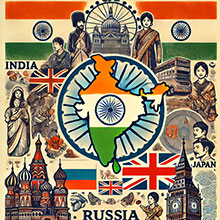Points of previous collum
- Acceptance of diversity and adaptability to change: India has a long history of embracing diverse cultures and influences, and adapting to changes with flexibility.
- Fusion of spirituality and innovation: Indian culture is characterized by a unique fusion of spirituality, tradition, and innovation, which has driven the country’s evolution.
- Lessons of harmony and coexistence: India’s history symbolizes unity in diversity, offering the world valuable lessons on harmony and coexistence.
India’s Strategic Alliances and Global Influence
India’s Strategic Alliances with the UK, Russia, and Japan: A Historical and Evolving Journey

India’s diplomatic journey with the United Kingdom, Russia, and Japan reflects its growing global influence, shaped by unique historical contexts and strategic, economic, and cultural ties. From colonial legacies to Cold War partnerships and post-war collaborations, these alliances highlight India’s resilience, adaptability, and mutual respect across different eras.
The United Kingdom: A Complex Colonial Legacy and Its Impact on India
India’s relationship with the United Kingdom is one of the most profound and intricate in modern history, deeply rooted in the colonial era. The British first arrived in India in the early 17th century as traders through the East India Company. Over time, their influence expanded, and by the mid-19th century, following the Indian Rebellion of 1857, the British Crown formally took control, initiating a century of direct colonial rule. This period profoundly shaped India’s political, social, and economic landscape, leaving a lasting legacy of both positive and negative impacts.
On the positive side, British rule brought significant infrastructure development, with investments in railways, telegraphs, roads, and ports that connected India’s vast regions and facilitated trade. Western education, engineering, science, and legal systems were introduced, modernizing governance and creating a new class of educated Indians. Western medicine also gained dominance, with British medical schools, hospitals, and pharmaceutical companies taking precedence. Many prominent Indian professionals were educated in British institutions, contributing to India’s modernization. The British Empire capitalized on Indian talent across sectors, using Indian labor and expertise to expand their influence globally. This legacy is visible today, with Indian communities present in former British territories like Malaysia, Singapore, Australia, Fiji, African nations, and Europe.
However, British rule also had several detrimental effects. Economically, India was heavily exploited, with vast resources and wealth transferred to Britain. Indian medical science, particularly Ayurveda—a holistic system focused on natural healing—suffered as British policies favored Western medicine, marginalizing India’s traditional knowledge. Additionally, British policies often disregarded India’s cultural heritage and exacerbated famines and poverty. Despite these challenges, India’s cultural resilience, rooted in the values of forgiveness and karma from Hindu philosophy, helped the nation maintain a positive relationship with the UK post-independence in 1947. Today, India and the UK enjoy strong ties in trade, education, and technology, with the Indian diaspora in the UK playing a vital role in strengthening these relationships.
Indian philosophy encourages a positive outlook, emphasizing forgiveness and respect for the land. This is why Indians, wherever they settle, integrate and respect the country as their motherland. A prime example of this is the UK’s former Prime Minister, Mr. Rishi Sunak, whose Indian heritage reflects the enduring bond between the two nations.
Russia: A Strategic Cold War Partner
India’s relationship with Russia, unlike its colonial ties with the UK, is built on mutual respect and strategic cooperation. During the Cold War, India found a reliable ally in the Soviet Union, which supported India’s non-aligned stance and helped modernize its defense and industrial sectors. The Soviet Union played a crucial role in backing India on key international matters, including its stance on Kashmir, and provided critical military and technical assistance during conflicts, notably the 1971 Bangladesh Liberation War.
Over the decades, this partnership expanded to include joint military exercises, technology transfers—including nuclear power and steel plants—and collaboration in space exploration. Cultural exchanges also thrived, with Indian cinema gaining popularity in Russia during the mid-20th century. Even after the Soviet Union’s dissolution, India and Russia have maintained strong ties, with Russia remaining a major defense supplier and a key partner in critical projects. The relationship remains strong, driven by shared geopolitical interests and a mutual desire to shape a more balanced global order.
Japan: A Post-War Alliance of Mutual Respect and Growth
India’s relationship with Japan, though more recent, has evolved into one of its most dynamic and promising partnerships. This bond traces back to World War II when Japan supported Indian nationalist leader Subhas Chandra Bose in his efforts to liberate India from British rule. Bose’s Indian National Army (INA) received backing from Japan, marking the start of a partnership rooted in mutual respect. India and Japan share a unique relationship, not only as strategic partners but also through cultural and religious ties, with Buddhism serving as a core value that connects the two nations.
Conclusion
India’s strategic alliances with the UK, Russia, and Japan reflect its growing global influence and are shaped by unique historical, cultural, and economic ties. The relationship with the UK, while rooted in a complex colonial past, has evolved into a strong partnership in trade, education, and technology. With Russia, India has maintained a long-standing defense and strategic partnership, especially during the Cold War. Meanwhile, India’s ties with Japan, though more recent, are rapidly growing, driven by mutual respect and shared cultural values, particularly Buddhism. Together, these alliances underscore India’s adaptability and resilience on the global stage.
Profile
Pankaj Garg
CEO Innovation Thru Energy Co., Ltd, (ITE)

Pankaj Garg holds a degree in Computer Science Engineering from the National Institute of Technology and an MBA in Marketing from Fox Business School, USA. He embarked on his journey to Japan 34 years ago and, over the past 34+ years, has built a distinguished career specializing in AI, robotics, semiconductors, applied engineering, and new product invention and development. He has contributed his expertise to prestigious organizations such as Kobe Steel, Yaskawa Electric, Cirrus Logic, Intel, and NASA/Caltech startups. His broad skill set encompasses R&D, engineering, product manufacturing, and global technical sales and marketing.
Pankaj also holds over 30 patents in the areas of semiconductors, green energy, and next-generation energy, reflecting his innovative contributions to these cutting-edge industries.
Driven by a mission to tackle critical global challenges like climate change, food waste, and pharmaceutical cold chain deficiencies, Pankaj set out to create a seamless, globally standardized cold chain logistics system. After leaving Intel, he founded ITE Co., Ltd. in 2007, entirely self-funded. Today, ITE serves over 250 clients globally, with a growing presence in the Indian market. Inspired by Japan’s dedication to innovation and craftsmanship, Pankaj has fostered a culture of excellence, integrity, and continuous improvement at ITE. His guiding principles are drawn from the teachings of Karma (as outlined in the Bhagavad Gita) and Kaizen, along with his extensive global business experience, particularly in the U.S., which shape ITE’s customer-first philosophy.
Pankaj possesses deep expertise in areas such as Digital Transformation (DX), semiconductors, the food retail industry, medical cold chains, pharmaceuticals, GDP/GMP standards, life sciences, cold chain logistics value chains, Ayurveda, yoga, and the food industry. This diverse knowledge has been instrumental in his success across multiple domains, positioning him as a visionary leader in cold chain logistics, climate change initiatives, and the green energy sector. Under his leadership, ITE stands as a testament to his technical expertise, entrepreneurial spirit, and commitment to solving global challenges.
Innovation Thru Energy Co., Ltd.
Since its establishment in 2007, Innovation Thru Energy Co., Ltd. (ITE) has been a company specializing in temperature management, providing its unique IceBattery(R) System—a comprehensive cold chain logistics platform and DX solutions—to over 250 companies worldwide. All IceBattery(R) products are designed and developed in-house. The IceBattery(R) System is a revolutionary cooling system capable of maintaining uniform internal temperatures for extended periods across all modes of transportation, from 4L boxes to 40FT large containers/trucks.
For this column
Having spent over 35 years in Japan, my perspective on the country, its culture, and its people is shaped by a unique blend of an Indian heritage and deep integration into Japanese society. My family’s global ties, including my grandfather’s role as Vice Ambassador to Japan in 1959, have instilled in me a broad, inclusive worldview.
I see Japan and India as deeply complementary, with shared values and a synergistic relationship rooted in history, culture, and religion. Japan’s support for India during World War II and the spiritual connections between the two nations underscore this bond.
I believe in harnessing this synergy to create a powerful partnership where India’s global leadership and Japan’s excellence in business, manufacturing, and operational efficiency can unite. Together, we can forge a path towards a future that embodies the true essence of Buddhism and Karma—bringing peace, prosperity, and wisdom to the world as one united family.
contents
- 【Unlocking New Possibilities through Market Characteristics and Cultural Understanding in India】1.A Journey Through India’s History and Cultural Ethos Pankaj Garg – CEO Innovation Thru Energy Co., Ltd, (ITE)
- 【Unlocking New Possibilities through Market Characteristics and Cultural Understanding in India】2.India’s Strategic Alliances and Global Influence Pankaj Garg – CEO Innovation Thru Energy Co., Ltd, (ITE)
- 【Unlocking New Possibilities through Market Characteristics and Cultural Understanding in India】3.The Evolution of India’s Educational Landscape Pankaj Garg – CEO Innovation Thru Energy Co., Ltd, (ITE)
- 【Unlocking New Possibilities through Market Characteristics and Cultural Understanding in India】4.India’s Industrial Growth Since Independence: The Role of State-Owned Enterprises, Private Sector, and Overseas Collaboration Pankaj Garg – CEO Innovation Thru Energy Co., Ltd, (ITE)
- 【Unlocking New Possibilities through Market Characteristics and Cultural Understanding in India】5.India’s Healthcare System: A Comprehensive Overview Pankaj Garg – CEO Innovation Thru Energy Co., Ltd, (ITE)
- 【Unlocking New Possibilities through Market Characteristics and Cultural Understanding in India】6.Introduction to Ayurveda Pankaj Garg – CEO Innovation Thru Energy Co., Ltd, (ITE)
- 【Unlocking New Possibilities through Market Characteristics and Cultural Understanding in India】7.Ayurveda for a Healthy and Balanced Life Pankaj Garg – CEO Innovation Thru Energy Co., Ltd, (ITE)


















